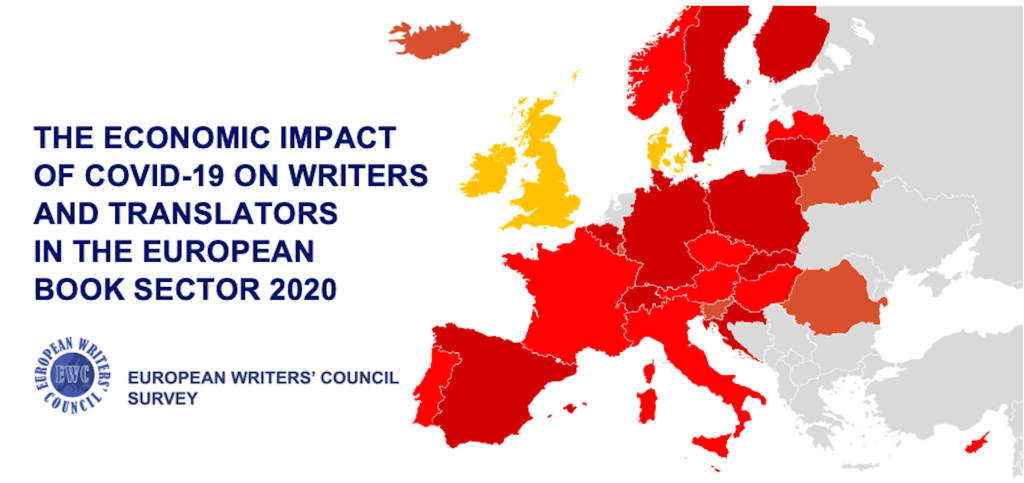Results of the EWC Survey “The Economic Impact of COVID-19 on Writers and Translators in the European Book Sector” and 37 recommendations for a sustainable future on EU and national level
Brussels, 2 June 2020. The European Writers’ Council conducted the survey “Economic Impact of Covid-19 on Writers and Translators in the European Book Sector“, from March 30 to April 24 2020. 33 writers’ and translators’ organisations from 24 countries (including the non-EU countries Belarus, Switzerland, the United Kingdom and the EEA countries Iceland, and Norway), representing 128,000 authors of all genres and writing in 27 languages, participated and contributed 70 pages in total of figures, proposals and testimonials on ten specific questions proposed online.
The aim of the survey is to obtain a more in-depth description of the loss of income of writers and translators, its consequences for them and the book sector as a whole, as well as to obtain concrete proposals for the support of writers and translators, as they are the origin and source of the whole book value chain. In addition, an overview of functioning or non-existing national support schemes (until to 21 May 2020), positive new developments and negative effects across the book sector was obtained.
These figures and insights, together with the proposals and national reports of 33 organisations of writers and translators, form the basis for a 37 points-catalogue of recommended short, middle and long term measures, as well as upcoming proposals for the EU and for national legislation.

EXECUTIVE SUMMARY
During April 2020, 33 writers’ and translators’ organisations from 24 countries, including the non-EU countries Belarus, Switzerland, the United Kingdom and the EEA countries Iceland, and Norway, representing 128,000 authors of all genres, responded to a survey by the European Writers’ Council on the economic impact of the Covid-19 crisis on writers and translators. The respondents were able to provide information on areas of losses, severity of the crisis and its consequences, on emergency aid measures, positive developments, negative effects, future prospects, and proposals.
The survey is concluded with 37 recommendations to decision makers of the European Union and national governments.
The three key points:
(1) The consequences for the entire book sector are seen as very serious, and will hit the authors in a second wave and will directly threaten the diversity of European literature.
(2) Online activities and digital distribution need support not only through funding but also through a much more author-friendly legislation and remuneration.
(3) Freelance full-time authors and translators have a significant loss due to events that are cancelled until the end of the year and fall through most national aid programs.
Losses and economic impact on writers and translators in the book sector
- 64 % expect losses because of postponed publications of their planned titles
- 40 % expect losses because of postponed contracts and reduced royalty advances
- 97 % of writers and translators experience a high loss of income mostly
because of cancelled lectures, workshops and readings - 60 % estimate the effects as very to extremely severe on the income situation of authors
Actions, positive and negative developments
- the world of books moved online: readings, lectures, podcasts – but without remuneration schemes for writers and translators, since there are no portals with payment functions, direct licensing options for authors or legally binding conditions
- significant increase of e-book-piracy, increase of price dumping, increase of e-lending and low-priced subscription models without fair remuneration for authors
- in a regular year 500,000 to 600,000 new titles are published in Europe. Understandable projections assume 150,000 fewer titles in 2020 and 2021
National emergency funds: writers and translators are left behind
- there was hardly a country where tailor-made support for the book sector was available
- nine countries reported no support or very belated aid measures by the national government
- most of the national emergency aid schemes are NOT available for writers and translators
A selection of the 37 recommendations of proposed measures
- full implementation of Chapter 3 of the DSM directive on copyright
- compensation fund for past and future losses
- remuneration schemes for online activities for authors and support of portals with pay-functions
- national increase in budgets for educational materials
- sustainable actions against e-book and audio book piracy
- harmonising the working conditions and social insurance systems
- regional development to preserve cultural venues
- sustainable funding for the European wide exchange of literature
- a book for every child – supporting reading promotion
TO THE FULL SURVEY (30 pages, pdf)
READ ALSO THE EWC STATEMENT: THE DIVERSITY OF EUROPEAN LITERATURE IS UNDER THREAT: WRITERS AND TRANSLATORS CALL ON THE DECISION MAKERS FOR AN OVERALL POLITICAL COMMITMENT TO AUTHORS AND CULTURE
The European Writers’ Council (EWC) is the federation of 41 national organisations of professional writers and translators in 27 countries including the EU, as well as Belarus, Iceland, Norway, Switzerland, Turkey and Montenegro, altogether writing in 31 languages and in all genres. The EWC represents over 150,000 individual authors. www.europeanwriterscouncil.eu

